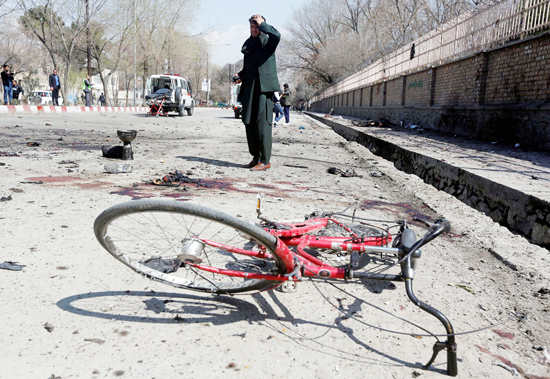KABUL, Mar 21:
An Islamic State suicide bomber struck on the road to a Shiite shrine in Afghanistan’s capital today, killing at least 29 people as Afghans celebrated the Persian new year.
The Public Health Ministry said another 52 people were wounded in the attack, which was carried out by a bomber on foot.
The Islamic State group claimed the attack in an online statement, according to the SITE Intelligence Group, which monitors jihadi websites. IS said the attack targeted “a gathering of Shiites celebrating Nauruz.”
The Persian new year, known in Afghanistan as Nauruz, is a national holiday, and the country’s minority Shiites typically celebrate by visiting shrines.
The Sunni extremists of IS have repeatedly targeted Shiites, who they view as apostates deserving of death.
The attack took place near Kabul University and a Government hospital, around one kilometer away from the Sakhi shrine, where people were gathered to celebrate the new year, said Gen. Daud Amin, Kabul’s police chief.
Daud said the attacker managed to slip past police checkpoints set up along the road. He said an investigation into the security breach is underway, and that anyone found to have neglected his duties would be punished.
The bomber was less than 200 metres from Karte Sakhi shrine where many Afghans gather every year to mark Nawrooz, which is the traditional Persian new year holiday.
The same shrine was attacked in October 2016 when Islamic State gunmen killed 18 people gathered to mark Ashura, an important date for many Muslims, especially Shiites.
A man who was standing metres from where the explosion happened said that he saw “at least four bodies in blood” on the ground.
There was no immediate claim of responsibility for the assault but Taliban and Islamic State militants have increasingly targeted the war-weary city in recent months.
The blast comes days after a Taliban suicide attacker blew up a bomb-laden car in the Afghan capital, causing multiple casualties.
The Taliban faces growing pressure to take up a recent offer by Afghan President Ashraf Ghani of peace talks to end the 16-year war. So far it has given only a muted response.
This latest suicide attack underscores the growing challenge facing Afghan and foreign forces to protect the already heavily militarised city.
Authorities had increased security ahead of Nawrooz festivities, which militants have previously struck with deadly force.
General John Nicholson, who leads US and NATO forces in Afghanistan, recently told reporters that protecting Kabul was a priority for foreign troops.
“Kabul is our main effort right now, to harden Kabul, to protect the people of Kabul and the international community that are here because of the strategic impact that has and the importance to the campaign,” Nicholson said.
The latest attack comes as US Chairman of Joint Chiefs of Staff General Joseph Dunford visits Afghanistan to assess the military campaign against insurgents.
Despite calls for the Taliban to sit down with the Afghan Government, it appears to have few reasons to negotiate.
The group has been resurgent since the withdrawal of US-led NATO combat troops at the end of 2014, taking back territory and devastating Afghanistan’s beleaguered security forces.
In October, insurgents controlled or influenced nearly half of Afghanistan’s districts — double the percentage in 2015, the US government’s office of the Special Inspector General for Afghanistan Reconstruction said in January.
Over the same period, the watchdog said, the number of districts under Afghan government control or influence fell to its lowest level since December 2015. (AGENCIES)


